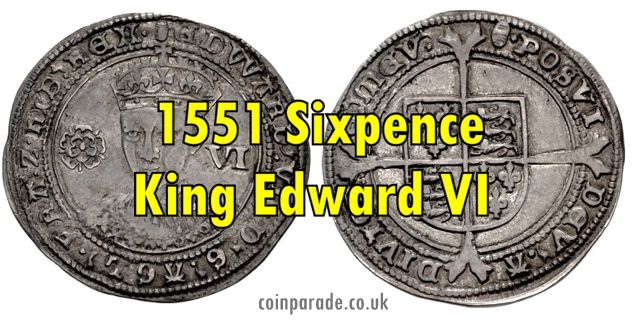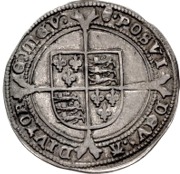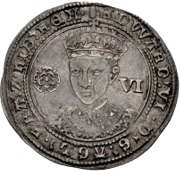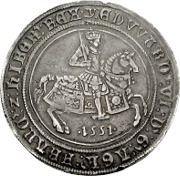
 The 1551 Sixpence - Edward VI
The 1551 Sixpence - Edward VIAn Edward VI fine silver sixpence, struck between 1551 and 1553 at the Tower Mint, London. Third period, SCBC 2483. This coin is in VF condition. Diameter 33mm and weight is 6.14g.
The Reverse shows the Royal coat-of-arms with a long cross fourchée.
 The Obverse shows a portrait of Edward VI. Rose on left. 'VI' on right is the mark of value, representing 6 pence.
The Obverse shows a portrait of Edward VI. Rose on left. 'VI' on right is the mark of value, representing 6 pence.Images used by permission of CNGCoins.
Mintage: Not known
Minted at The Royal Mint
More information (monarch, year, mint, country, category) can be found below coin listings.
Below are some coins currently being offered on eBay. As an eBay Partner, We may be compensated if you make a purchase.
List items on:
List items on:
Remember 1551 ?
1551 in Roman Numerals is MDLI. Monarch is Edward VI, the Boy King. The Regent is John Dudley. Silver sixpence and silver crown first minted.
Edward VI (1547-1553)
 Edward VI of England was born on 12 October 1537, the son of Henry VIII and Jane Seymour. He became King of England and Ireland in 1547 aged only 9 years old, having a Coronation on 20 February 1547. He was in the house of Tudor. Due to his young age, the realm was governed by a regency council led by his uncle Edward Seymour and then by John Dudley.
Edward VI of England was born on 12 October 1537, the son of Henry VIII and Jane Seymour. He became King of England and Ireland in 1547 aged only 9 years old, having a Coronation on 20 February 1547. He was in the house of Tudor. Due to his young age, the realm was governed by a regency council led by his uncle Edward Seymour and then by John Dudley.Edward died on 6 July 1553 (just 15 years old) after a serious illness and was buried in Westminster Abbey. Edward had decided that his first cousin once removed, the 16-year-old Lady Jane Grey, should become Queen. However, after his death his half-sisters Mary and Elizabeth desputed the succession and after only nine days Jane was removed from the throne (and subsequently executed) and Mary became Queen of England and Ireland.
The first coins issued in the reign of King Edward VI were in the name and some with the image of his father King Henry VIII. Later coins show the image of the boy King. There were still troubles with the debasement of gold and silver introduced by Henry VIII. There are many variations, some very nice coins but can be very expensive (up to six figures). Several Mints around the country were used.
Category: Sixpences
The Sixpence (half a shilling) was a British silver coin that was first minted 1551 and virtually continuously until decimalisation in 1971. They were often known as 'tanners'. They are small coins, the last minted had a diameter of about 19.4 mm.
Specifications:
- Year Minted: 1551-1970
- Diameter: 19.41 mm
- Weight: 2.83g (1816-1970)
- Edge: Milled
- Metal:
- 1551–1816: Silver
- 1816–1920: 92.5% Silver
- 1920–1946: 50% Silver
- 1947–1970 Cupronickel. Zero Silver
In today's money they are 2½p. It doesn't sound much but at the time it was a weeks pocket money! It was a popular coin when in circulation and is now popular with collectors as it has a long history and many nice specimens can be obtained at affordable prices.
Which Mint: The Royal Mint
The Royal Mint is the designated place for the UK to mint coins. It dates back well over 1000 years and is a Government-owned company. Formed in the reign of Alfred the Great about the year 886, during the period 1279-1812 it was generally referred to as The Tower Mint as it was housed at the Tower of London. The Master of The Royal Mint has included famous figures such as Sir Isaac Newton.
Since 2010 it has operated as Royal Mint Ltd, a company owned by HM Treasury, under an exclusive contract to supply all coinage for the UK although it also produces medals and coins for other countries. It is currently located at Llantrisant, Wales.
Country of Origin: United Kingdom
The United Kingdom (UK) is the Union of England, Scotland, Wales and Northern Ireland. It is often refered to as Great Britain (GBR). It has a long, rich history. The orignal coinage was Pounds, Shillings and Pence but since decimalisation on 15 February 1971, it is £1 = 100p, that is One Pound = 100 pence. The coinage of the UK is also a long history, the Royal Mint being established as long ago as 886AD when coins were hammered. Today there is perhaps 30 billion coins in circulation, and many (numismatic) collectors coins and sets are issued frequently in gold, silver and other metals.








